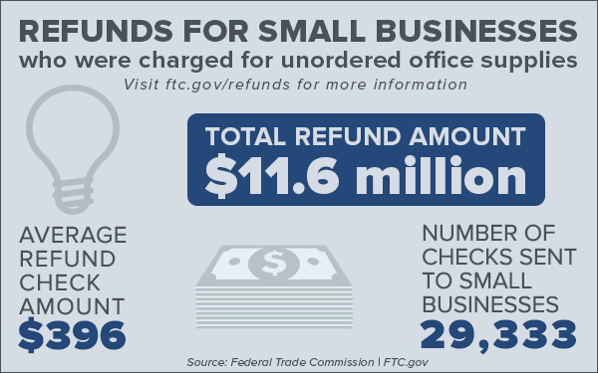On her Control album, Janet Jackson posed the musical question, “What have you done for me lately?” It’s a fair question for small businesses to ask the FTC and the most recent answer would be “Sent 29,333 refund checks averaging $396 and totaling $11.6 million to companies and nonprofits tricked into paying invoices – unvoices, really – for merchandise they didn’t order.” While we’re on the subject, there is something you can do for charities, churches, and other nonprofits in your community that might be targets of similar scams.
Using names like Standard Industries LLC or Midway Industries (and to be clear, there are legitimate companies with similar names), the defendants in an FTC action placed calls to small businesses, government agencies, and charities. To soften up the unsuspecting employee who picked up the phone, schmoozy telemarketers falsely claimed they’d done business with the company before. They said things like “We just need to confirm your address,” “We’re following up on a previous order,” or “We’d like to offer you a free sample (or catalog or gift).” Furthering the charm offensive, they often asked for the employee’s name and contact information – a personal tidbit they later misused.
 When the bill arrived – it was typically for light bulbs or cleaning products, the kinds of stuff just about every business has on hand – the invoice often listed the employee as the person who had placed the order. Seeing the familiar name, the person responsible for paying the bills would typically send a check, unaware that the merchandise was unordered. If the scam worked, the defendants used a lather-rinse-repeat cycle to target the company again and again, sometimes hitting the same target using different names. But if businesses balked, the defendants claimed to have an audio “verifying” the order (an audio they failed to produce, by the way). In other instances, the defendants tried to placate exasperated business owners with a “discount,” an offer some of them took just to put the whole annoying episode behind them.
When the bill arrived – it was typically for light bulbs or cleaning products, the kinds of stuff just about every business has on hand – the invoice often listed the employee as the person who had placed the order. Seeing the familiar name, the person responsible for paying the bills would typically send a check, unaware that the merchandise was unordered. If the scam worked, the defendants used a lather-rinse-repeat cycle to target the company again and again, sometimes hitting the same target using different names. But if businesses balked, the defendants claimed to have an audio “verifying” the order (an audio they failed to produce, by the way). In other instances, the defendants tried to placate exasperated business owners with a “discount,” an offer some of them took just to put the whole annoying episode behind them.
Cases like this have resulted in multimillion dollar judgments, millions back for defrauded businesses, lifetime telemarketing bans, and even jail time for certain kingpins. Looking to protect your company from B2B con artists? The FTC’s brochure Scams and Your Small Business suggests steps you can take to keep your guard up. Isn’t it worth 15 minutes at your next staff meeting to educate your employees about how to spot, stop, and report a scam targeting your small business? Get free copies of the booklet at the FTC’s bulk order site. (The brochure is also available in Spanish.)
Clueing your staff in about B2B scams is important, but there’s another step you can take to protect your community. The defendants in many of these cases also ripped off churches, charities, and other groups trying to do good. In the Standard/Midway action, for example, the FTC relied on the testimony of people affiliated with nonprofits that the defendants scammed: a homeless shelter in Ohio, a Massachusetts church, and a Montana YWCA that serves as a shelter for battered women and children. Why do con artists target organizations like that? Because charities rely on overworked staff and unpaid volunteers who might not be familiar with the business side of running a nonprofit. If you donate time to a local charity or are active in a community group or at your place of worship, put your business savvy to work by educating volunteers and staff about scams that target them, too.
Did you receive a refund relating to this FTC case? As the check says, be sure to cash it within 60 days. The FTC never requires people to pay money or provide personal information to cash refund checks.

In reply to Why does the FTC issue the by Moe
Click on this highlighted sentence in the first paragraph of this blog: “Sent 29,333 refund checks averaging $396 and totaling $11.6 million" and it will take you to the press release, which explains that:
In the summer of 2016, the U.S. District Court for the District of Maryland entered settlement or default orders against all the defendants FTC charges in a case filed in 2014. The orders barred them from the illegal conduct alleged in the complaint and imposed financial judgments, which the Commission is now using to provide refunds.